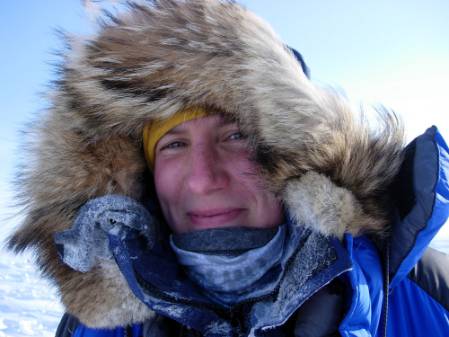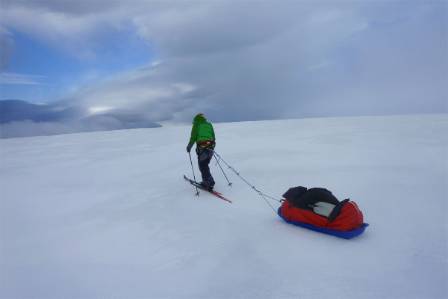Today, 1 November 2011, we pay our respects to Captain Scott's Terra Nova sledging team who set out to conquer the South Pole exactly 100 years ago on 1 November 1911 from their base camp on Antarctica's Ross Island.
Bleak times: Scott's Terra Nova expedition and pony-led sledges at the Great Ice Barrier a month after they left on 1 November 1911. Image from David Wilson's book, The Lost Photographs of Captain Scott. © Richard Kossow
On 1 November 1911, Captain Scott and his pony-led team left base camp in Antarctica's Ross Island for the South Pole. Scott was accompanied by support parties, innovative motor sledges (abandoned later on during the trip due to mechanical failure in the cold) and ponies for their ultimate journey south to conquer the Pole. The dog team had left Cape Evans a few days earlier. The day before, 31 October 1911, Scott wrote in his diary:
'The sun is shining and the wind dropping. Meares and Ponting are just off to Hut Point. Atkinson and Keohane will probably leave in an hour or so as arranged, and if the weather holds, we shall all get off to-morrow. So here end the entries in this diary with the first chapter of our History. The future is in the lap of the gods; I can think of nothing left undone to deserve success.'
On 1 November 1911, the day he actually set off, Scott recalled:
'This morning we got away in detachments – Michael, Nobby, Chinaman were first to get away about 11 A.M. The little devil Christopher was harnessed with the usual difficulty and started in kicking mood, Oates holding on for all he was worth. Bones ambled off gently with Crean, and I led Snippets in his wake. Ten minutes after Evans and Snatcher passed at the usual full speed. The wind blew very strong at the Razor Back and the sky was threatening – the ponies hate the wind.'
Many of Scott's early diary entries centred around the plight and personalities of the ponies, which he showed immense concern for throughout the journey, until they met their end.
In our 21st-century world of global communications and exclusive adventure holidays, it's hard to imagine what it would have felt like to embark on such remote expeditions into the unknown, and this is why Scott's diaries and photographs are all the more remarkable and poignant.
But as contemporary Antarctic explorer Felicity Aston says:
'Scott wasn’t on a suicide mission when he set out for the Pole. He had spent years making careful plans and preparations to mitigate the risks and give him and his men the best possible chance of success and survival. When they set out, they had every intention of returning. I think anyone setting out on an expedition that involves a degree of risk – even today – would feel exactly the same as Scott and his team.'
Explorer Felicity Aston sets off on 1 November 2011 on her expedition to the South Pole to become the first woman to cross Antarctica alone. Below, preparing in Iceland last year. © Felicity Aston
Today, British explorer Felicity Aston, pictured above, is embarking on her 1,700km, 65-day journey to become the first woman in the world to cross Antarctica alone.
Last week, we asked her for some thoughts on her solo Kaspersky ONE Trans-Antarctic Expedition and how things have changed since Scott's time.
'I don’t think satellite communications have affected our passion for exploration, they are simply a tool that allows us to push further and harder than ever before. Perhaps the biggest difference today is our ability to communicate the experience as it happens. Using social media and satellite technology I can share my adventure in real time with a worldwide audience – a century ago the public had to wait years.'
'Polar travel is much more of a mental challenge than a physical one. Success or failure has more to do with what is going on in your head than the size of your muscles. On this trip I will be completely by myself for 70 days which just adds to the mental pressure of the challenge so I think keeping myself motivated and focused for that length of time on my own will be the hardest part.
'I feel equal amounts of nerves and excitement about my expedition. In my mind I am already in Antarctica and so there is a certain amount of frustration that even though I leave the UK in a few days, it will actually be three weeks before I start on my journey.Then there is the anxiety about whether I have thought of everything, whether I am prepared. But most of all I am looking forward to the calm that comes when I begin skiing – the expedition routine is strangely relaxing after all the hectic months of preparation!
'When I read about the adventures of others I always wonder if I would be capable of doing the same. Over the last ten years each of my expeditions has pushed me a little further mentally or physically but I still don’t feel that I have reached my limit. I would like to know where my personal limits are – perhaps I’ll find them on this journey.
'Strange as it may sound I am actually really looking forward to the experience of being alone in Antarctica. It is a fantastically magical place and to have it completely to myself will be an incredible privilege.'
We wish Felicity every success. Keep up to date with the Kaspersky ONE Trans-Antarctic expedition on Felicity Aston's expedition blog.
Watch out for more Scott updates as we get ready for the opening of Scott's Last Expedition here at the Museum on 20 January 2012.
Find out about The Lost Photographs of Captain Scott
Explore the legacy of the ‘heroic era of Antarctic exploration’ that remains in Antarctica, including pre-fabricated huts used as base camps and the possessions the explorers left behind in them.
In our Antarctic Conservation blog discover what it’s like to work in Antarctica and follow the experiences of conservators working to preserve the artefacts left behind by the great explorers such as Scott.





